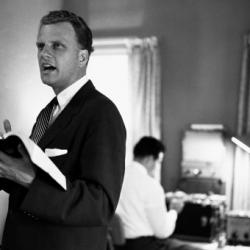I remember when I came to faith at the age of 21, I wanted to be the next Billy Graham. What I meant by that sentiment was simply that I had a massive hope to reach millions with the gospel of Christ. What young Christian wouldn’t day dream about being able to hold a massive audience captive with the gospel? Today, as I reflect upon the news of his death, I am reminded much of the hope we have as Christians. Death does not have power over us and the life worth living is one in fearless opposition to the notion that death still holds the final word.
I didn’t learn a tremendous amount about Billy Graham until he was the focus of a brief chunk in my undergraduate church history course. Now, naturally a few pages in a survey of church history won’t encapsulate the full impact he made, nor would a blog post or two that I stumbled upon. It piqued my curiosity. I had always heard nothing but positive thoughts regarding Billy Graham; he made massive inroads for the sake of the gospel, met with and advised several presidents, and left an evangelistic legacy within the broader church. In my brief studies, I came away encouraged to find several things I believe all stripes of Christians can learn from him.
Billy Graham: the Good of the Local Church
While there are several people surrounding the man in his ministry, it must be said that Billy Graham’s platform was unique. I remember one of the best things I heard about him was that at a relatively early point in his evangelistic ministry, he made the move to contact local churches so that these hordes of people claiming newfound faith could be discipled. There was a need felt – that many would “be saved” and then go on without becoming part of a church, and thusly, fall away from that faith, and Billy Graham took that head on.
Secondly, I genuinely believe he had a great passion to reach those who didn’t know Christ. Furthermore, because of his efforts to partner with local churches, I sense many of those people were led in a positive direction. Billy Graham met with people around the nation to ensure that after one of his events, people could get plugged into a local church and learn how to walk in Christ. That effort cannot be downplayed, and his sense of importance of the local church is more than admirable. It was the local churches he partnered with that enables the legacy of Christ to move forward. He was wise enough to recognize that even though he was the lead figure at many of these revival events, he was not capable of fulfilling every need.
Last, and here’s the really important thing: I firmly believe that Billy Graham was used greatly of God to lead many to a genuine faith in Christ. No matter what problematic inferences to his theology and methodology one might draw, that is something every camp can embrace. I would argue that for those with Reformed convictions, we ought to embrace it all the more, because we of all people know that God can and often does draw a straight line with a crooked stick. In some fashion, we all have our blind spots and maladies, and we all hold to some defunct conceptions of Scriptural truth.
In all these things, it was clear that Billy Graham highlighted the importance of the local church and he did not see his evangelistic enterprises outside of that light. He worked, hand in hand, to develop a program operating behind the scenes to ensure people did not simply know of Christ, but continued to grow in the knowledge of Him. This is a beautiful thing – and something that is far too often missing from modern day evangelistic enterprises. While we might be tempted to look in abject criticism and deduce a different manner of doing it, it is quite clear he considered the long-haul rather than the simple, emotionally-laden conversion experience. I say we rejoice greatly in this, namely, because he actually did something.
Billy Graham: Shaping the Moral Culture of the Church
It is without question that Billy Graham has left a lasting legacy in service to Christ, but perhaps one of the questions we will be left with is in what fashion he shaped the moral culture of the church. Graham did not hesitate to call people to a deeper conviction on obedience to the Christian faith. Routinely, he slammed the notion that a Christian could be an individual who tolerates capitulation. Yet what is more than this is that this did not remain something absent from his addresses to the American people as a whole.
To the church in particular though, he wrote, “Tolerance, in one sense, implies the compromise of one’s convictions, a yielding of ground upon important issues. Hence, over-tolerance in moral issues has made us soft, flabby and devoid of conviction. We have become tolerant about divorce; we have become tolerant about the use of alcohol; we have become tolerant about delinquency; we have become tolerant about wickedness in high places; we have become tolerant about immorality; we have become tolerant about crime and we have become tolerant about godlessness. We have become tolerant of unbelief.”
For Billy Graham, the notion of tolerance was at odds with the narrow road – that is, that the road to salvation was the due course Christ laid out. It is not the hypocritical fashion of those who would claim Christ, yet live a life devoid of the Christian ethic. In addition, it is certainly not a matter of claiming to love another, yet living a life devoid of love. It was, however, a life lived out in harmony with the demands Scripture placed upon those in Christ. It cannot be denied that his influence steeped into the society at large, especially when we consider his partnerships with men like Martin Luther King Jr.
Yet perhaps most unique in the role Graham served was his unique capacity to acknowledge his own shortcomings and mistakes in humility. What was evidently shown in this was the simple power of a gracious response to being rightly accused of something. He was not only a man who didn’t pull punches, but he was willing to receive a few of them as well. In one instance of confrontation, Billy Graham said, “I’ve had to admit errors in judgment, and I’ve found Christian people more than generous in understanding my faults.” In this, he modeled both the conviction to heed the moral imperatives of Scripture, and the humility to admit when he fell short of that aim.
Conclusion
I genuinely sense there is much people of all stripes can learn from a man like Billy Graham. I’ll say it again, I do genuinely believe he was used of God in great ways, even though I might look at some of his methods and beliefs with a different conviction. However, the greater story in all of this is the simple truth that for those in Christ, there is the wonder and beauty of the resurrection.
If there were no resurrection for those in Christ, we of all men are to be pitied. Our lives spent evangelizing, discipling, singing, giving, writing, etc., are all in vain. Yet on this day Billy Graham has met the very substance of his faith: Christ. There are no lingering doubts, sins, or vestiges of being in a world devastated by sin. There is no more looking through the glass dimly, but seeing the radiance of His glory in full. This is the ultimate hope, and the hope we point you to, reader.
It is an enviable thing to watch Billy enter the presence of his maker – but my hope is that like the late Dr. Sproul, we would be motivated with an evangelistic zeal. My hope is that we partake in the efforts of the Great Commission and that the fullness of the Gentiles is brought in so we may see the return of the Lord. We may never reach the impact of the late Billy Graham, but my dear brothers and sisters, what a treasure is it that we might share in even a modicum of this?
Yet it must be said, the focus of Graham was in utter rebellion to the notion that death holds the final say. His life was one of rebellion to death and for that reason, he has life eternal.
For a wonderful treatment of Billy Graham, please see this resource.

















